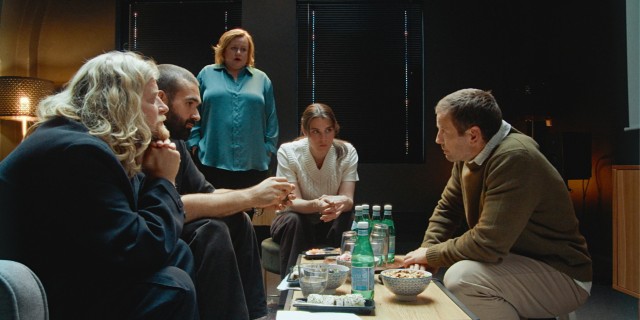It is well known that the best writers “write what they know”, and the same could be said of great filmmakers. The production process of bringing any film to life – be it a feature, short, or commercial – is fraught with chaos, drama and, inevitably, politics. This makes the film-within-a-film concept fertile ground for meta jokes and irony. Often used as transgressive commentary on the creative process, it also offers a knowing wink at its own reflection, and today’s film demonstrates just how effective it can be when it’s done right.
Directed by Mauritz Brekke Solberg (Juli) and Daniel Fure Schwarz, Offline gives the audience a glimpse into the advertising industry’s modern day obsession with diversity and ethnic representation and exposes the funny side of it when it’s taken to the extreme. Based on a true story, the sixteen-minute narrative unfolds through increasingly absurd and uncomfortable – though never unbelievable – gags, brilliantly performed by a cast that showcases nordic humour at its finest. Offline is an absolute delight both for those who are in the know about how the industry works and those who are blissfully unaware of it.
“Hopefully people will feel uncomfortable and have a good laugh”
The story follows a production company who meet their client – a major security brand – at a so-called offline meeting, to review and approve the fine cut of a TV commercial. When the diversity consultant brings up a potential issue around the skin colour of one of the actors, the situation quickly diverts into the quicksand terrain of “political correctness”. Faced with a dilemma – stay true to their beliefs or please the client at the expense of crossing an ethical line – the filmmakers attempt to navigate the complexities of modern day issues in the advertising world.
As a filmmaker who’s been working at a creative agency for the past 15 years, I know how much handholding, negotiating and compromise it takes to bring a story to life and how much of what is said during that process should never leave the four walls of the editing suite. Solberg and Schwarz shared with S/W that they based Offline on their own experiences and felt that – “after having been in so many strange situations we had to make a film about it. We hope that people will recognize these types of situations, across industries, and see the mismatch between what’s being shown on the screen and what is discussed behind closed rooms. Hopefully people will feel uncomfortable and have a good laugh.”

“The film was shot on two cameras, with the actors acting being live on video from different rooms.” – the directors discuss their production.
Offline has great fun satirising the characters and the scenarios they find themselves in, but they are not just thinly-sketched caricatures that happen to be very funny. Instead, they are acutely observed and, as a result, utterly believable. Take Lena, the young, up-and-coming film director determined to fight for her creative vision and stand her moral ground – until the prospect of securing more work soon makes her waver. Then there’s Maggie, the well-meaning but inexperienced client, who despite meaning well is easily swayed into making some questionable decisions. It’s a sharp reminder that the road to hell is paved with good intentions.
Solberg and Schwarz also poke fun at the industry’s obsession with diversity and ethnic representation which, rightfully, top the priority list for most brands. However, as Offline illustrates, the efforts are often reduced to box-ticking exercises amongst groups of people who look and think the same way. The discussions around changing the shade of the actor’s skin, or the hushed conversation about casting a man who pretended to have Down’s syndrome rather than a boy who actually had the condition, are pure comedy gold. While these scenes are hilariously sharp they are also extremely uncomfortable to watch – a wining formula that cements Solberg and Schwarz as filmmakers to admire and keep a close eye on.
Offline doesn’t rely on glossy visuals to seduce its viewers. Instead, it draws us in with its grounded approach and excellent writing, and the result is both cringe-worthy and side-splittingly funny – exactly as the directors intended it to be.

 Serafima Serafimova
Serafima Serafimova